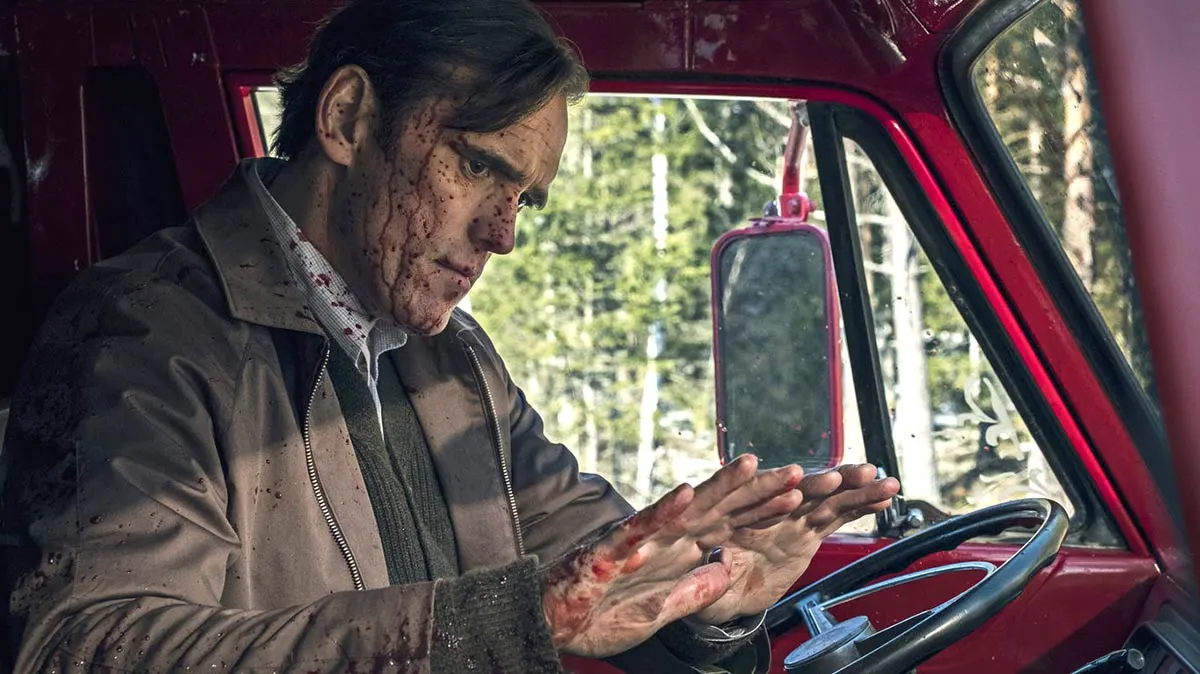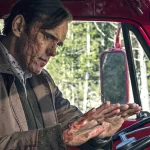 Directed & Screenplay by Lars Von Trier
Directed & Screenplay by Lars Von Trier
Starring: Matt Dillion, Bruno Ganz, Uma Thurman, Riley Keough, Jeremy Davies
I’ve never been one to shy away from “controversial” films. In fact, I think they’re something to think about and discuss after the experience is over. For many filmmakers, there is an aim to tell a truth in their filmmaking. Some may find that truth to be a bit controversial. Lars Von Trier is such a filmmaker. He is one who has gained an increasingly brilliant career and reputation for being “controversial” with what he does, says, and the films under his belt.
When it first came out, I had the pleasure of seeing the controversial one-night-only screening of the Director’s Cut of The House That Jack Built and watching it again to update this review. It’s good shit. This film is one that you have to take in with an open mind. You need to see it all to be able to keep you steady in figuring out what it’s about.
With The House That Jack Built, Von Trier returns from his six-year absence to bring us a film that both have a lot to say while confusing audiences. He brings us the methods and ideology of a psychopathic serial killer through films like Henry: Portrait of a Serial Killer (1986) or American Psycho (2000).
The House That Jack Built tells the story of Jack (Matt Dillon), a highly intelligent engineer who has OCD and hopes one day to build his dream home. The House That Jack Built establishes Jack’s foundation from the ground up. He tells his story to Verge (Bruno Ganz), a mysterious figure to Jack and the audience, detailing five incidents over his 12-year killing spree. These incidences impacted the serial killer he became and is.

Let’s get this out of the way from the get-go. The House That Jack Built is not an easy film to sit through, nor should it be. When diving into the thoughts and actions of a serial killer, things can’t always be linear. That being said, there are some highly uncomfortable moments for all to see scattered throughout. You will want to laugh, you will want to scream, and you will want to turn your head away. All of these are appropriate reactions. But through the nearly three hours of the film, you will find yourself locked to see what happens next.
Von Trier builds the film’s direction similar to that of a house. He peppers Jack’s foundations across the film, giving you limited access and glimpses of his childhood. But the little we’re given amounts to so much. It becomes influential in piecing together what Jack believes in and how he thinks. Von Trier also frames and structures the story with the killings, broken down into five incidents. Detailing each vividly to keep the foundation together. He installs the mindset into the audience that this story is something truly gruesome, and this character is genuinely evil and narcissistic. Last but not least, Von Trier finishes this with a literal descent into hell, a staircase spiraling down until he is to the very bottom.
Much like Von Trier’s previous films, his script is mixed with dark humor and an ever-changing philosophy that evolves within the structure of the narrative. With Jack, he does this in a way that sometimes feels a little pretentious. Jack feels the need to be overly intelligent because he is. He feels the need to explain things because he can. Jack’s character is built by the ever-growing philosophies and knowledge that he holds, and he develops them into his own ideology throughout the film. It becomes a slow descent into getting inside Jack’s brain while looking solely at his actions and response.
While talking about the script of The House That Jack Built, one has to address the difficult moments of excessive violence. All of the depicted violence (especially in the third incident) made my entire audience either laugh or gasp in collective disbelief. We also wondered why there wasn’t MORE. For a film that prompted so many walkouts, surely the violence had to be surreal, right? I think it was pretty tame in at least three of the incidents presented. Each killing featured a type of systematic motive of operation, and afterward, you hear his reasoning and thought process. However, it would have been great if it was less thought, and more action. People usually don’t want more blood on the screen, but I’m a big gore-hound, so it left me wanting more.

Let’s talk about how monumentally brilliant Matt Dillon is on the acting spectrum. As Jack, this is something completely different from what we’re used to seeing from Dillon. To be honest, it comes as a welcomed surprise. Dillon plays the title character as a stone-cold, hilarious, brilliant, but stoic kind of human monster. It helps Dillon evolve Jack within Von Trier’s script but allows him to do his own thing.
Throughout the 12 years of Jack’s killing spree, we see how Jack changes – from having OCD to conquering it. You believe it’s happening when Dillon goes from each incident without hesitation. One minute, he’s cleanly shaven. The next minute, he’s wild. One minute, he’s thinking about blood on the floor. The next minute, he doesn’t care. And Von Trier tricks you a little bit to get you to like him. He’s incredibly charming at some points and a little charismatic as well. It’s an incredible transformation for the actor to go from things so light to something so twisted and nail it without trying.
Another fantastic performance was that of the forever brilliant Bruno Ganz as Verge. He not only works with Dillon fantastically but together, they work magic and have chemistry of wits that work so well. Sadly, many of the other performances didn’t stand out as much as Dillon, Ganz, or even David Bailie, who plays S.P. However, mad props have to be given to Sofie Gråbøl and the two boys that were part of the third incident. They will blow you away. A little bit too literally, perhaps.
While this film is “controversial,” it very much isn’t as bad as people may think. Yes, they do some horrid stuff to children, women, and an animal, but at the end of the day, it’s all fiction. (PETA actually praised Von Trier for not physically hurting an animal during filming.) But you get a massive amount of good stuff with this mixture of violence, ideology, and philosophy. You get a well-told story that weaves the life of a figure that you truly will never understand. This might be for the best.
Von Trier produces something that will stick out in his body of work. You won’t remember this as much as Antichrist (2009) or Melancholia (2011), but you won’t forget it either. No matter the controversy surrounding it, The House That Jack Built is an entertaining and intriguing story. One that does a great deal of character development with a gripping narrative to build a stable house.
Previously published on Nightmare on Film Street


